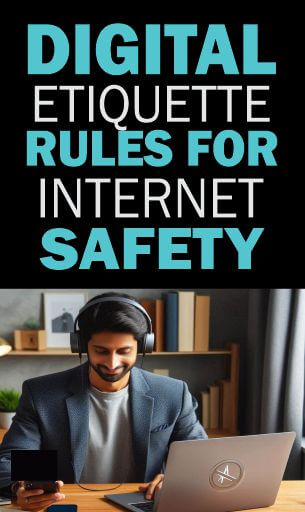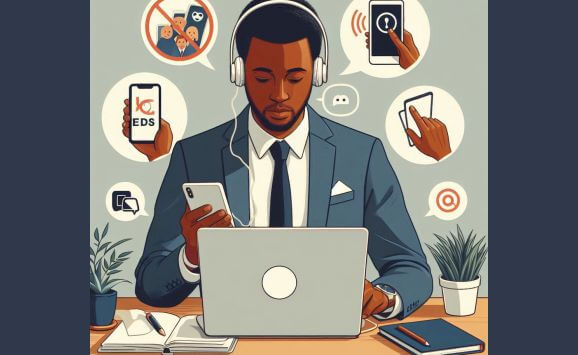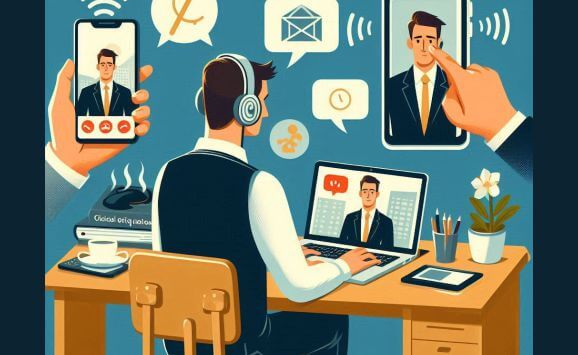Last updated on April 23rd, 2025 at 03:15 pm
Check out the rules of netiquette for good behaviour online and how to apply digital etiquette for positive relationships in the virtual world.
With the rise of social media and the internet, people can freely say things they would find difficult to say in person. This is where the netiquette, also called internet etiquette, comes in.
It is essential for maintaining civility and respect in online interactions.
As our online presence burgeons, observing these rules helps encourage positive communication, avoid misunderstandings, and build a useful online community.
This guide explores the core principles of internet rules, highlighting their importance in encouraging respectful and productive digital interactions.
Suggested: Being a gentleman
You might want to pin the image below.

Key Takeaways
- Cyber etiquette is essential for maintaining civility and respect in online interactions and promoting positive communication.
- Following digital etiquette rules can help in building positive online relationships.
- Netiquette has evolved with technological advancements, changes in online platforms, and societal norms to address new challenges and promote responsible online behavior.
- Internet rules emphasize thinking before communicating, respecting others, avoiding fake information, being mindful of digital footprints and more.
What is Digital Etiquette, also Called Netiquette?
Digital etiquette, also known as netiquette, is the set of rules and best practices for polite and respectful behavior when communicating online platforms including email, social media, video calls, and online forums.
The rules aim to promote a healthy online environment by preaching the importance of clear communication, respect for the time of others, and privacy while eschewing behaviours that are offensive.
The core importance of cyber etiquette is to instill discipline, promote collaboration, and minimize conflict that might arise from the use of the internet.
Related: Tips for Email Etiquette
Benefits of Practicing Digital Etiquette

- Building Positive Online Relationships: Observing internet rules helps establish respectful and meaningful connections online.
- Enhancing Online Reputation and Credibility: Adhering to netiquette improves your reputation and credibility by demonstrating respect, reliability, and thoughtful engagement.
- Promoting a Respectful and Inclusive Community: Netiquette encourages a welcoming environment by respecting diverse backgrounds and perspectives.
- Avoiding Conflicts and Misunderstandings: Clear communication and respectful behavior reduce the likelihood of conflicts and misunderstandings.
- Promoting Effective Communication and Collaboration: Proper grammar, punctuation, and clear messaging enhance communication and collaboration.
Related: Understanding Social Media Etiquette
How Netiquette Has Evolved over the Years
In the early days of the internet, when email and bulletin boards were the primary means of communication, netiquette focused on basic guidelines, such as not typing in all capital letters (interpreted as yelling) and avoiding excessive personal information sharing.
The evolution of cyber etiquette has been shaped by technological advancements, changes in online platforms, and societal norms.
Let’s take a closer look:
Technological Advancements
Cyber etiquette began with basic guidelines in the early Internet era, like avoiding all-caps and excessive personal information.
As new tools emerged, such as instant messaging, social media, and multimedia platforms, cyber etiquette adapted to include the proper use of images, videos, emojis, and mobile messaging.
Changes in Online Platforms
The rise of social media and online communities introduced new etiquette around content sharing, commenting, and engagement.
Netiquette expanded to include rules for respectful participation, avoiding trolling, and adhering to community guidelines set by moderators.
Societal Norms
As internet use became more widespread, expectations for online behavior increased. Issues like cyberbullying and privacy concerns led to stricter guidelines and reporting systems. Cyber etiquette now emphasizes responsible data sharing and respectful online conduct.
Recommended: How to Conduct a Cybersecurity Risk Assessment
Timeline of Netiquette Evolution
Early Internet (Late 1960s – Early 1990s): Limited communication through Bulletin Board Systems (BBS) and email, with basic guidelines emerging.
1990s: The first formal cyber etiquette guidelines were created, focusing on respect and courtesy in online communication.
Growth of the Internet: With the expansion of online communities and platforms, internet rules evolved to include platform-specific rules and address new issues like privacy and spam.
Modern Era: Cyber rules incorporate cultural sensitivity and inclusive language to respect diverse perspectives in global online interactions.
Suggested: Gentlemen’s Good Conduct in Society.
Emergence of Netiquette Rules

As internet usage grew in the 1990s, the need for online interaction guidelines led to the creation of internet rules.
First Netiquette Guidelines
In 1994, Arlene Rinaldi created the first netiquette guidelines known as the “Netiquette Guidelines for Online Communication,” setting early standards for respectful online behavior
Influence of Social Norms
Online rules were shaped by existing social norms, incorporating offline manners like respect, courtesy, and privacy into online interactions.
Initial Focus
Early cyber etiquette emphasized basic principles such as respect, clear language, and avoiding personal attacks, aiming to encourage a positive online environment.
Expansion with Internet Growth
As the internet expanded, digital etiquette evolved to address new challenges, including the rise of diverse online communities and platforms.
Specific guidelines emerged for different environments, such as social media and chat rooms, focusing on platform-specific norms.
Privacy, Spam, and Security
Cyber rules now include guidelines for privacy, handling spam, and online security. This involves protecting personal information, avoiding unsolicited messages, and being cautious about online threats.
Cultural and Global Considerations
Cyber etiquette also considers cultural differences and aims for inclusivity, respecting diverse perspectives and communication styles to ensure respectful global interactions.
Related: Cyber Hygiene for Gentlemen
How Does Digital Etiquette Affect the Gentleman?

Cyber etiquette plays a significant role in shaping the behavior and conduct of individuals, including gentlemen.
It influences the way gentlemen engage in online communication, allowing them to maintain a respectful and polite manner while interacting with others.
Firstly, just like gentleman etiquette, cyber rules teach gentlemen the importance of using proper language and tone when communicating online.
By avoiding offensive or derogatory language and employing polite words and phrases, gentlemen can ensure their messages and comments are respectful and considerate, promoting constructive and harmonious online discussions.
Secondly, internet rules emphasize the importance of respecting others’ privacy and personal information.
A gentleman respects boundaries and refrains from sharing or soliciting personal details without permission to maintain a sense of trust and security in online interactions.
Lastly, digital etiquette educates gentlemen on the importance of listening and being open-minded when engaging in online discussions.
By actively engaging in thoughtful and empathetic conversations, gentlemen can build positive relationships and contribute meaningfully to online communities.
Related: Tips for a Successful Online Dating for Men
Digital Etiquette Rules
1. Think Before You Communicate Online
One important rule of cyber etiquette is to engage your thoughts before you post or comment online as you can impulsively post something that you will regret in the frenzy of the moment
When you hit that send button, you might not retrace your steps. So take your time and review your post before you hit the send button.
2. Respect Your Fellow Online Users
Another digital etiquette rule is to be respectful to your fellow online users. Don’t because you are anonymous or invisible you become rude or say things you would never say in person.
Treat others with courtesy as all internet users are humans. On the other hand, being too rude or violating the laws of the internet can land you in legal trouble.
3. Beware of Fake People
Also, you should know that there are a lot of fake people on the internet just as there are fake news and misinformation.
It is important to fact-check the information you are posting so you don’t join the bandwagon.
4. Beware of Your Digital Footprint
Digital footprints are a thing and you should always have that at the back of your mind. Every activity you engage in online has a permanent trace, whether it is your social media post or email.
So, when you post, consider how it may affect others at the receiving end and its implications in the future.
5. Use Appropriate Language and Tone
Use language that is suitable for the platform and the audience you are interacting with. Avoid using offensive language or engaging in heated arguments that can escalate into online disputes.
7. Avoid Spamming and Overuse Of Caps Lock
Do not flood others’ inboxes or comment sections with irrelevant or repetitive content. Additionally, avoid using excessive capital letters, as it can be interpreted as shouting and is generally considered rude.
8. Respect Privacy and Confidentiality
Do not share personal information, such as addresses or phone numbers, without the consent of the individuals involved. Respect the boundaries of others and refrain from sharing private conversations or information.
9. Use Proper Formatting and Grammar
Ensure that your messages are clear and easy to understand through the use of appropriate formatting, punctuation, and grammar. Avoid excessive use of abbreviations or acronyms that may confuse others.
10. Give Credit Where it is Due
If you are sharing or reposting content or ideas from others, give proper credit to the source. Plagiarism is not only unethical but also a violation of netiquette principles.
11. Be Mindful of Cultural Differences
Recognize that online interactions often involve people from diverse backgrounds and cultures. Be respectful and considerate of these differences, avoiding assumptions or stereotyping based on cultural or ethnic backgrounds.
12. Be Mindful of Timing Zones
Being mindful of time zones is an important aspect of netiquette, showing respect for others’ schedules.
In a global context, communication can be affected by different time zones. As a gentleman, recognize that while you might be resting, others could be at work or busy.
Being considerate of these differences helps avoid disrupting others’ routines and demonstrates respect for their time.
13. Avoid Spamming or Excessive Posting
Spamming is a behavior you should avoid. Sending multiple messages, whether for business or personal reasons, is considered spamming and can lead to penalties, such as being banned from platforms.
To maintain a respectful online presence, follow platform rules regarding posting frequency and ensure your contributions are relevant and valuable.
Related: How to Polish Your Online Identity
Digital Etiquette Safety Tips
- Use Strong Passwords: Use strong, complicated passwords for all your online logins to prevent unauthorized access.
- Keep Your Software Updated: Keep your operating system, browser, and other software updated to eliminate security risks.
- Be Cautious with Links and Attachments: Desist from clicking on unknown links or attachments from unknown sources to avoid malware or phishing attacks.
- Use Secure Connections: Use secure connections (HTTPS) always to protect your data and prevent spying.
- Monitor Your Online Presence: Monitor your online presence to ensure that your data is not being used behind you.
- Use Two-Factor Authentication: Enable two-factor authentication for all your online accounts for an extra layer of security.
- Be Mindful of Your Online Footprint: Be mindful of your online footprint and the information you share online, as it can be used to trace you.
- Use Antivirus Software: Install and regularly update antivirus software to protect your devices from malware and viruses.
- Keep Your Devices Secure: Keep your devices secure by using a lock screen and ensuring that your devices are not left unattended.
Report Suspicious Activities: Report any suspicious activities or potential security breaches to the relevant authorities or online platforms.
Frequently Asked Questions
In which situation should you follow the rules of digital etiquette?
You should follow the rules of digital etiquette in all online interactions, including social media, email, messaging apps, and online forums.
What are some examples of bad digital etiquette?
Examples of bad digital etiquette include using all capital letters, sharing too much personal information, and being rude or aggressive in online interactions.
Final Word from Gentsways
The importance of digital etiquette, or netiquette, cannot be overstated in today’s interconnected world.
As online interactions continue to shape our relationships and communities, following the principles of cyber etiquette is crucial for maintaining respect, civility, and positive communication.
By adhering to internet rules, you can build meaningful online relationships, enhance your online reputation, avoid conflicts, and promote effective collaboration.
References:
- Rules of Online Civility
- Netiquette, the Rules of the Internet
- Netiquette and Internet Safety
- https://www.gentlemansgazette.com/rules-civility-digital-etiquette/
- https://eric.ed.gov/?id=EJ1313366
- https://www.britannica.com/topic/netiquette
Pyo Merez is a men’s lifestyle enthusiast and writer about the gentleman’s place and impact on society. Raised by a distinguished gentleman dad, he offers unique insights into how the mind of a gentleman works and how societal norms shape gentlemen’s identity and vice versa.
Through his insightful articles, Pyo taps into the depths of gentleman culture to provide perspectives on etiquette and manners in modern society.

